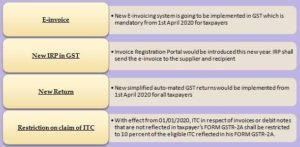
- E-invoice : New E-invoicing system is going to be implemented in GST which is mandatory from 1st April 2020 for taxpayers having an annual turnover exceeding Rs. 100 crore and then gradually to all B2B suppliers in the future. A mechanism for the continuous upload of revenue invoices on a real-time basis. This is the most remarkable change coming in Indian Book Keeping.
- New IRP in GST: Invoice Registration Portal would be introduced this new year. IRP shall make an e-invoice of the invoices uploaded by the supplier. IRP shall send the e-invoice to the supplier and recipient. IRP shall send e-invoices data to GSTN portal
- New Return: New simplified auto-mated GST returns would be implemented from 1st April 2020 for all taxpayers. This new returns system will increase compliance and reduce tax evasion to a larger extent.
- Annexure 1 and Annexure 2: Anx-1 of Outward Supplies and Anx-2 of Inward Supplies will be the future base for filing of all GST Returns, thus these 2 reports will be the key for future reports of GST which will replace GSTR 1 and GSTR-2A.
- Restriction on claim of ITC: With effect from 01/01/2020, ITC in respect of invoices or debit notes that are not reflected in taxpayer’s FORM GSTR-2A shall be restricted to 10 percent of the eligible ITC reflected in his FORM GSTR-2A. Earlier the restriction was 20%. A major change in ITC availment.

- E-way Bill and GSTR-1: From 11th January, 2020 non-filing of GSTR-1 for two consecutive periods would block generation of E-way Bill. Thus, regular filing of GSTR-1 and GSTR-3B in year 2020 should go hand in hand.
- Waiver of late fees for Non-filing of GSTR-1: If the taxpayer has failed to file GSTR-1 from July 2017 to November 2019, then the taxpayers can file such returns till 10 January, 2020 and the late fees for the same has been waived of. This will also affect GSTR-2A of the recipient to claim ITC.
- GST Audit and Annual Return: The due date for filing GST Annual Return and Audit Report for F.Y. 2017-18 has been further extended to 31st January, 2020.The due date for filing GST Annual Return and Audit Report for F.Y 2018-19 has been extended to 31st March, 2020. For F.Y 2019-20 new format may be brought in because of inherent limitations in current forms.
- DIN notices and E-scrutiny: Due to decline in collection of revenue from GST, large scale e-scrutiny and e-assessment notices with DIN for the returns from July 2017 may be taken up. It would be done in order to check significant deviations in returns.
- GSTN Network is proposed to be reengineered for more taxpayer-centric services like reminder of return filing, status of refund, ITC matches and mismatches, etc.





